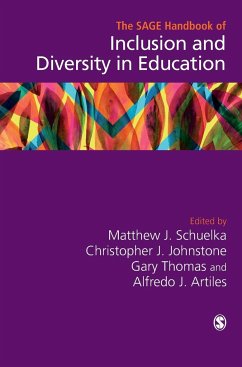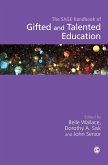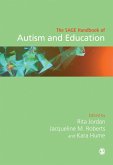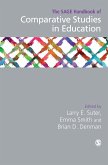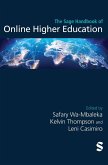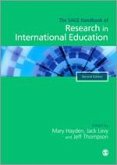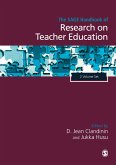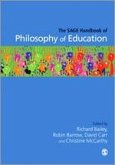The SAGE Handbook of Inclusion and Diversity in Education
Herausgegeben:Schuelka, Matthew J.; Johnstone, Christopher J.; Thomas, Gary; Artiles, Alfredo J.
The SAGE Handbook of Inclusion and Diversity in Education
Herausgegeben:Schuelka, Matthew J.; Johnstone, Christopher J.; Thomas, Gary; Artiles, Alfredo J.
- Gebundenes Buch
- Merkliste
- Auf die Merkliste
- Bewerten Bewerten
- Teilen
- Produkt teilen
- Produkterinnerung
- Produkterinnerung
This handbook examines policy and practice from around the world with respect to broadly conceived notions of inclusion and diversity within education. It sets out to provide a critical and comprehensive overview of current thinking and debate around aspects such as inclusive education rights, philosophy, context, policy, systems, and practices for a global audience. This makes it an ideal text for researchers and those involved in policy-making, as well as those teaching in classrooms today. Chapters are separated across three key parts:
Part I: Conceptualizations and Possibilities of…mehr
Andere Kunden interessierten sich auch für
![The SAGE Handbook of Gifted and Talented Education The SAGE Handbook of Gifted and Talented Education]() The SAGE Handbook of Gifted and Talented Education131,99 €
The SAGE Handbook of Gifted and Talented Education131,99 €![The SAGE Handbook of Autism and Education The SAGE Handbook of Autism and Education]() The SAGE Handbook of Autism and Education131,99 €
The SAGE Handbook of Autism and Education131,99 €![The SAGE Handbook of Comparative Studies in Education The SAGE Handbook of Comparative Studies in Education]() The SAGE Handbook of Comparative Studies in Education131,99 €
The SAGE Handbook of Comparative Studies in Education131,99 €![The Sage Handbook of Online Higher Education The Sage Handbook of Online Higher Education]() The Sage Handbook of Online Higher Education118,99 €
The Sage Handbook of Online Higher Education118,99 €![The Sage Handbook of Research in International Education The Sage Handbook of Research in International Education]() The Sage Handbook of Research in International Education131,99 €
The Sage Handbook of Research in International Education131,99 €![The Sage Handbook of Research on Teacher Education The Sage Handbook of Research on Teacher Education]() The Sage Handbook of Research on Teacher Education451,99 €
The Sage Handbook of Research on Teacher Education451,99 €![The SAGE Handbook of Philosophy of Education The SAGE Handbook of Philosophy of Education]() The SAGE Handbook of Philosophy of Education28,99 €
The SAGE Handbook of Philosophy of Education28,99 €-
-
-
This handbook examines policy and practice from around the world with respect to broadly conceived notions of inclusion and diversity within education. It sets out to provide a critical and comprehensive overview of current thinking and debate around aspects such as inclusive education rights, philosophy, context, policy, systems, and practices for a global audience. This makes it an ideal text for researchers and those involved in policy-making, as well as those teaching in classrooms today. Chapters are separated across three key parts:
Part I: Conceptualizations and Possibilities of Inclusion and Diversity in Education
Part II: Inclusion and Diversity in Educational Practices, Policies, and Systems
Part III: Inclusion and Diversity in Global and Local Educational Contexts
Part I: Conceptualizations and Possibilities of Inclusion and Diversity in Education
Part II: Inclusion and Diversity in Educational Practices, Policies, and Systems
Part III: Inclusion and Diversity in Global and Local Educational Contexts
Produktdetails
- Produktdetails
- Verlag: SAGE Publications Ltd / Sage Publications
- Seitenzahl: 652
- Erscheinungstermin: 3. Oktober 2019
- Englisch
- Abmessung: 250mm x 175mm x 39mm
- Gewicht: 1263g
- ISBN-13: 9781526435552
- ISBN-10: 1526435551
- Artikelnr.: 54612407
- Herstellerkennzeichnung
- Libri GmbH
- Europaallee 1
- 36244 Bad Hersfeld
- gpsr@libri.de
- Verlag: SAGE Publications Ltd / Sage Publications
- Seitenzahl: 652
- Erscheinungstermin: 3. Oktober 2019
- Englisch
- Abmessung: 250mm x 175mm x 39mm
- Gewicht: 1263g
- ISBN-13: 9781526435552
- ISBN-10: 1526435551
- Artikelnr.: 54612407
- Herstellerkennzeichnung
- Libri GmbH
- Europaallee 1
- 36244 Bad Hersfeld
- gpsr@libri.de
Matthew J. Schuelka is Lecturer of Inclusive Education at the University of Birmingham School of Education. His primary area of scholarship concerns socio-cultural understandings of disability and education, and a focus on design and systems of schooling for all students. He holds advanced degrees from the University of Vermont, Stanford University, and the University of Minnesota (PhD in Comparative International Education and Development). Dr. Schuelka has been involved in education, research, and development projects all over the world, including Zambia, Serbia, Malaysia, Japan, Denmark, India, United States, United Kingdom, and particularly in the Himalayan country of Bhutan. At the time of this writing he is Primary Investigator on two major research projects in Bhutan: "Educational Values for a Sustainable Society: Head, Hands, Heart, and Happiness in Bhutan and Beyond" (Toyota Foundation); and "Understanding, Developing, and Supporting Meaningful Work for Youth with Disabilities in Bhutan: Networks, Communities, and Transitions" (ESRC Global Challenge Research Fund). His most recent book publication is Education in Bhutan: Culture, Schooling, and Gross National Happiness (Springer). Christopher J. Johnstone is Assistant Professor of Comparative and International Development Education at the University of Minnesota. His research examines how educational systems become more responsive to the diversity of stakeholders they serve through conscious removal of barriers and development of enabling environments. Dr. Johnstone coordinates his university's Leadership in International and Intercultural Education PhD program and has worked professionally in over 40 countries. Johnstone has worked extensively with organizations such as UNICEF, US Department of State, and others on inclusive education and inclusive youth development projects. At the time of this writing, he currently serves as the co-lead for Kenya in the "Learn, Earn, Save" project, the Principal Investigator of a Global Spotlight Grant study of disability identity in India, the Principal Investigator for a six-university case study on accessibility in learning abroad; and on two U.S. Department of State grants focused on inclusive education (with partners in Armenia, India, Kazakhstan, and Ukraine). His recent work can be found in Prospects, International Journal of Education and Development, and the British Journal of Educational Technology. Gary Thomas is Professor of Inclusion and Diversity at the University of Birmingham School of Education. Before university teaching, he worked as a teacher and as an educational psychologist. In higher education - at the University of Leeds, Oxford Brookes University, University of the West of Englad, and University College London - his teaching and research have focused on inclusion, special education, and research methodology in education. Professor Thomas has received research funding as Principal Investigator from the AHRC, the ESRC, the Nuffield Foundation, the Leverhulme Trust, the DfE, Barnardos, the Cadmean Trust, local authorities and a range of other organisations. He is currently executive editor of the Educational Review journal. He was also the founding co-editor of the International Journal of Research and Method in Education and he has been a co-editor of the British Educational Research Journal. His latest book is Education: A Very Short Introduction (Oxford University Press), and his book for students on research methods, How to Do Your Research Project (SAGE), is now in its third edition. Alfredo J. Artiles is the Ryan C. Harris Professor of Special Education and Dean of the Graduate College at Arizona State University. His interdisciplinary scholarship focuses on understanding educational opportunities and inequities related to disability intersections with race, language, gender and social class. He directs the Equity Alliance and was elected Vice President of AERA. Dr. Artiles is an AERA Fellow, a former Spencer Foundation/ National Academy of Education Postdoctoral Fellow and was a Resident Fellow at Stanford University's Center for Advanced Study in the Behavioral Sciences. He has received numerous awards including a 2017 AERA Presidential Citation, the 2014 Division G Mentoring Award, the 2017 AERA Review of Research Award, and the 2012 Palmer O. Johnson Award. He edits the Teachers College Press book series "Disability, Culture, & Equity." Recent publications include Keeping the Promise? Contextualizing Inclusive Education in Developing Countries (Klinkhardt); The 2017 World Yearbook of Education: Assessment Inequalities (Routledge) and Inclusive education: Examining Equity on Five Continents (Harvard Education Press).
Introduction: Diversity and Inclusion in Education: Inclusive Education Scholarship in the Twenty-First Century - Matthew J. Schuelka, Christopher J. Johnstone, Gary Thomas, & Alfredo J. Artiles
Part 01: Conceptualizations and Possiblities of Inclusion and Diversity in Education
Chapter 1: Not Dead Yet? - Julie Allan & Roger Slee
Chapter 2: A Sociology of Special and Inclusive Education - Sally Tomlinson
Chapter 3: Unsettling "Inclusion" In The Global South: A Post-Colonial And Intersectional Approach To Disability, Gender, And Education - Xuan Thuy Nguyen
Chapter 4: Dewey and Philosophy of Inclusion - Scot Danforth
Chapter 5: Pursuing 'radical inclusion' within an era of neoliberal educational reform - Jessica K. Bacon
Chapter 6: Psychological Inclusion: Considering Students' Feelings of Belongingness and the Benefits for Academic Achievement - Alisha M. B. Braun
Chapter 7: Human Rights, Inclusive Education & Inter-Cultural Competence - Derrick Armstrong & Ann Cheryl Armstrong
Chapter 8: Sociocultural perspectives on curriculum, pedagogy and assessment: Implications for participation, belonging and building inclusive schools and classrooms - Missy Morton, Anne-Marie McIlroy & Annie Guerin
Chapter 9: Gender, poverty and educational equality - Amy North & Helen Longlands
Chapter 10: Inclusive Education as global development policy - Paula Frederica Hunt
Part 02: Inclusion and Diversity in Educational Practices, Policies and Systems
Chapter 11: Equity and Inclusivity in Education - Allyson Satter, Jessica Meisenheimer, & Wayne Sailor
Chapter 12: A Sentimental Education: Insights for Inclusive Reform from a University/School District Partnership - Deborah J. Gallagher, Amy J. Petersen, Danielle Cowley, & Shehreen Iqtadar
Chapter 13: Culturally Cognizant Research and Culturally Sustaining Practice: Promoting Authentic Inclusive Classrooms for Diverse Learners - David J. Connor, Beth A. Ferri, Layla Dehaiman, & Louis Olander
Chapter 14: Cross-Pollinating Culturally Sustaining Pedagogy and Universal Design for Learning: Toward an Inclusive Pedagogy That Accounts for Dis/Ability - Federico r. Waitoller & Kathleen A. King Thorius
Chapter 15: Effective Use of Teacher Assistants in Inclusive Classrooms - Ritu V. Chopra & Michael F. Giangreco
Chapter 16: Building 'restorative relationships': An actionable, practice-based model of inclusive school practice - Michal Razer & Victor J. Friedman
Chapter 17: Supporting gender and sexual diversity in schools: Teachers' perspectives, challenges, and possibilities - Elizabeth J. Meyer
Chapter 18: Financing Inclusive Education to Reduce Disparity in Education: Trends, issues and drivers - Serge Ebersold, Amanda Watkins, Edda Óskarsdóttir, & Cor Meijer
Chapter 19: Adapting Education Management Information Systems to Support Inclusive Education - Daniel Mont & Beth Sprunt
Chapter 20: Fostering Inclusive and Culturally Responsive Family-Professional Partnerships - Colby T. Kervick, Katharine G. Shepherd, & Shana J. Haines
Chapter 21: Culturally Responsive Teaching with Latino English Learners with Math Learning Disabilities - Naheed A. Abdulrahim & Michael J. Orosco
Chapter 22: Including Students with Severe Disabilities in General Education and the Potential of Universal Design for Learning for All Children - Bree A. Jimenez & Melissa E. Hudson
Chapter 23: Multi-disciplinary practice and inclusive education - Sue Soan
Chapter 24: Teaching Diverse Learners in Europe: Inspiring Practices and Lessons Learned from Germany, Iceland, Lithuania, Luxembourg, Spain and Sweden - Powell, J.J.W., Merz-Atalik, K., Alisauskiene, S., Brendel, M., Echeita, G., Guðjónsdóttir, H., Karlsdóttir, J., Milteniene, L., Meliene, R., Óskarsdóttir, E., Persson, B., Persson, E., Simón, C., Sandoval, M., Schwartz, A., Tiemann, H., & Weber, K
Chapter 25: Teacher professionalism, teacher agency, and student resilience in Chinese inclusive education: A sociological perspective - Guanglun Michael Mu
Chapter 26: Long Over-Due: Inclusive College for Students with Intellectual Disabilities - Kagendo Mutua, Amy Williamson, John Myrick, Jim Siders, & Dongjin Kwon
Part 03: Inclusion and Diversity in Global and Local Educational Contexts
Chapter 27: Diversity and inclusion in the classroom: young immigrant's perspectives in France and England - Oakleigh Welply
Chapter 28: The Experience of Inclusion in Danish Schools - between Politicization and Pedagogical Ideals - Thomas Thyrring Engsig
Chapter 29: Opening doors and mediating practices: Working toward inclusion in Tajikistan - Kate Lapham
Chapter 30: Gender, ethnicity and disability: approaching inclusivity in Myanmar's education reforms? - Elizabeth J.T. Maber & Khin Mar Aung
Chapter 31: Ways of knowing inclusion and diversity: Jumping off the one-way track to See Indigenous student behaviour - Anthony McKnight, Carol Speechley & Samantha McMahon
Chapter 32: Possibilities and challenges of inclusive education in Brazil: Understanding the role of socioeconomic factors - Fernanda T. Orsati, Rosane Lowenthal, & Carolina C. Nikaedo
Chapter 33: Implications for Teacher Training and Support for Inclusive Education: Empirical Evidence from Cambodia - Diana Kartika & Kazuo Kuroda
Chapter 34: "To Educate for Them in Different Ways;" Defining Inclusion in Popular and Intercultural Education in Argentina and Peru - Laura A. Valdiviezo & Jennifer Lee O'Donnell
Chapter 35: Inclusive and Special Education and the Question of Equity in Education: The Case of Finland - Juho Honkasilta, Raisa Ahtiainen, Ninja Hienonen and Markku Jahnukainen
Chapter 36: Contextual Influences on Inclusivity: The Singapore Experience - Levan Lim, Thana Thaver & Vasilis Strogilos
Chapter 37: The evolution of inclusive education in Mexico: policy, settings, achievements and perspectives - Silvia Romero-Contreras, Ismael García-Cedillo & Todd V. Fletcher
Chapter 38: RtI in the Chellenging Context of the Republic of Mauritius - Anick Tolbize
Chapter 39: Saying NO to Niceness: Innovative, progressive and transformative inclusive education with Australian Aboriginal students - Sheelagh Daniels-Mayes, Valerie Harwood, & Nyssa Murray
Chapter 40: Unheard Voices: Schooling Experiences of Parents Having Children with Disabilities - Sandhya Limaye
Chapter 41: Diversifying Inclusion: Perceptions Inclusive Education amongst Indigenous Families in Quito, Ecuador - Hannah Wagner, Maria Dolores Lasso, & Todd Fletcher
Part 01: Conceptualizations and Possiblities of Inclusion and Diversity in Education
Chapter 1: Not Dead Yet? - Julie Allan & Roger Slee
Chapter 2: A Sociology of Special and Inclusive Education - Sally Tomlinson
Chapter 3: Unsettling "Inclusion" In The Global South: A Post-Colonial And Intersectional Approach To Disability, Gender, And Education - Xuan Thuy Nguyen
Chapter 4: Dewey and Philosophy of Inclusion - Scot Danforth
Chapter 5: Pursuing 'radical inclusion' within an era of neoliberal educational reform - Jessica K. Bacon
Chapter 6: Psychological Inclusion: Considering Students' Feelings of Belongingness and the Benefits for Academic Achievement - Alisha M. B. Braun
Chapter 7: Human Rights, Inclusive Education & Inter-Cultural Competence - Derrick Armstrong & Ann Cheryl Armstrong
Chapter 8: Sociocultural perspectives on curriculum, pedagogy and assessment: Implications for participation, belonging and building inclusive schools and classrooms - Missy Morton, Anne-Marie McIlroy & Annie Guerin
Chapter 9: Gender, poverty and educational equality - Amy North & Helen Longlands
Chapter 10: Inclusive Education as global development policy - Paula Frederica Hunt
Part 02: Inclusion and Diversity in Educational Practices, Policies and Systems
Chapter 11: Equity and Inclusivity in Education - Allyson Satter, Jessica Meisenheimer, & Wayne Sailor
Chapter 12: A Sentimental Education: Insights for Inclusive Reform from a University/School District Partnership - Deborah J. Gallagher, Amy J. Petersen, Danielle Cowley, & Shehreen Iqtadar
Chapter 13: Culturally Cognizant Research and Culturally Sustaining Practice: Promoting Authentic Inclusive Classrooms for Diverse Learners - David J. Connor, Beth A. Ferri, Layla Dehaiman, & Louis Olander
Chapter 14: Cross-Pollinating Culturally Sustaining Pedagogy and Universal Design for Learning: Toward an Inclusive Pedagogy That Accounts for Dis/Ability - Federico r. Waitoller & Kathleen A. King Thorius
Chapter 15: Effective Use of Teacher Assistants in Inclusive Classrooms - Ritu V. Chopra & Michael F. Giangreco
Chapter 16: Building 'restorative relationships': An actionable, practice-based model of inclusive school practice - Michal Razer & Victor J. Friedman
Chapter 17: Supporting gender and sexual diversity in schools: Teachers' perspectives, challenges, and possibilities - Elizabeth J. Meyer
Chapter 18: Financing Inclusive Education to Reduce Disparity in Education: Trends, issues and drivers - Serge Ebersold, Amanda Watkins, Edda Óskarsdóttir, & Cor Meijer
Chapter 19: Adapting Education Management Information Systems to Support Inclusive Education - Daniel Mont & Beth Sprunt
Chapter 20: Fostering Inclusive and Culturally Responsive Family-Professional Partnerships - Colby T. Kervick, Katharine G. Shepherd, & Shana J. Haines
Chapter 21: Culturally Responsive Teaching with Latino English Learners with Math Learning Disabilities - Naheed A. Abdulrahim & Michael J. Orosco
Chapter 22: Including Students with Severe Disabilities in General Education and the Potential of Universal Design for Learning for All Children - Bree A. Jimenez & Melissa E. Hudson
Chapter 23: Multi-disciplinary practice and inclusive education - Sue Soan
Chapter 24: Teaching Diverse Learners in Europe: Inspiring Practices and Lessons Learned from Germany, Iceland, Lithuania, Luxembourg, Spain and Sweden - Powell, J.J.W., Merz-Atalik, K., Alisauskiene, S., Brendel, M., Echeita, G., Guðjónsdóttir, H., Karlsdóttir, J., Milteniene, L., Meliene, R., Óskarsdóttir, E., Persson, B., Persson, E., Simón, C., Sandoval, M., Schwartz, A., Tiemann, H., & Weber, K
Chapter 25: Teacher professionalism, teacher agency, and student resilience in Chinese inclusive education: A sociological perspective - Guanglun Michael Mu
Chapter 26: Long Over-Due: Inclusive College for Students with Intellectual Disabilities - Kagendo Mutua, Amy Williamson, John Myrick, Jim Siders, & Dongjin Kwon
Part 03: Inclusion and Diversity in Global and Local Educational Contexts
Chapter 27: Diversity and inclusion in the classroom: young immigrant's perspectives in France and England - Oakleigh Welply
Chapter 28: The Experience of Inclusion in Danish Schools - between Politicization and Pedagogical Ideals - Thomas Thyrring Engsig
Chapter 29: Opening doors and mediating practices: Working toward inclusion in Tajikistan - Kate Lapham
Chapter 30: Gender, ethnicity and disability: approaching inclusivity in Myanmar's education reforms? - Elizabeth J.T. Maber & Khin Mar Aung
Chapter 31: Ways of knowing inclusion and diversity: Jumping off the one-way track to See Indigenous student behaviour - Anthony McKnight, Carol Speechley & Samantha McMahon
Chapter 32: Possibilities and challenges of inclusive education in Brazil: Understanding the role of socioeconomic factors - Fernanda T. Orsati, Rosane Lowenthal, & Carolina C. Nikaedo
Chapter 33: Implications for Teacher Training and Support for Inclusive Education: Empirical Evidence from Cambodia - Diana Kartika & Kazuo Kuroda
Chapter 34: "To Educate for Them in Different Ways;" Defining Inclusion in Popular and Intercultural Education in Argentina and Peru - Laura A. Valdiviezo & Jennifer Lee O'Donnell
Chapter 35: Inclusive and Special Education and the Question of Equity in Education: The Case of Finland - Juho Honkasilta, Raisa Ahtiainen, Ninja Hienonen and Markku Jahnukainen
Chapter 36: Contextual Influences on Inclusivity: The Singapore Experience - Levan Lim, Thana Thaver & Vasilis Strogilos
Chapter 37: The evolution of inclusive education in Mexico: policy, settings, achievements and perspectives - Silvia Romero-Contreras, Ismael García-Cedillo & Todd V. Fletcher
Chapter 38: RtI in the Chellenging Context of the Republic of Mauritius - Anick Tolbize
Chapter 39: Saying NO to Niceness: Innovative, progressive and transformative inclusive education with Australian Aboriginal students - Sheelagh Daniels-Mayes, Valerie Harwood, & Nyssa Murray
Chapter 40: Unheard Voices: Schooling Experiences of Parents Having Children with Disabilities - Sandhya Limaye
Chapter 41: Diversifying Inclusion: Perceptions Inclusive Education amongst Indigenous Families in Quito, Ecuador - Hannah Wagner, Maria Dolores Lasso, & Todd Fletcher
Introduction: Diversity and Inclusion in Education: Inclusive Education Scholarship in the Twenty-First Century - Matthew J. Schuelka, Christopher J. Johnstone, Gary Thomas, & Alfredo J. Artiles
Part 01: Conceptualizations and Possiblities of Inclusion and Diversity in Education
Chapter 1: Not Dead Yet? - Julie Allan & Roger Slee
Chapter 2: A Sociology of Special and Inclusive Education - Sally Tomlinson
Chapter 3: Unsettling "Inclusion" In The Global South: A Post-Colonial And Intersectional Approach To Disability, Gender, And Education - Xuan Thuy Nguyen
Chapter 4: Dewey and Philosophy of Inclusion - Scot Danforth
Chapter 5: Pursuing 'radical inclusion' within an era of neoliberal educational reform - Jessica K. Bacon
Chapter 6: Psychological Inclusion: Considering Students' Feelings of Belongingness and the Benefits for Academic Achievement - Alisha M. B. Braun
Chapter 7: Human Rights, Inclusive Education & Inter-Cultural Competence - Derrick Armstrong & Ann Cheryl Armstrong
Chapter 8: Sociocultural perspectives on curriculum, pedagogy and assessment: Implications for participation, belonging and building inclusive schools and classrooms - Missy Morton, Anne-Marie McIlroy & Annie Guerin
Chapter 9: Gender, poverty and educational equality - Amy North & Helen Longlands
Chapter 10: Inclusive Education as global development policy - Paula Frederica Hunt
Part 02: Inclusion and Diversity in Educational Practices, Policies and Systems
Chapter 11: Equity and Inclusivity in Education - Allyson Satter, Jessica Meisenheimer, & Wayne Sailor
Chapter 12: A Sentimental Education: Insights for Inclusive Reform from a University/School District Partnership - Deborah J. Gallagher, Amy J. Petersen, Danielle Cowley, & Shehreen Iqtadar
Chapter 13: Culturally Cognizant Research and Culturally Sustaining Practice: Promoting Authentic Inclusive Classrooms for Diverse Learners - David J. Connor, Beth A. Ferri, Layla Dehaiman, & Louis Olander
Chapter 14: Cross-Pollinating Culturally Sustaining Pedagogy and Universal Design for Learning: Toward an Inclusive Pedagogy That Accounts for Dis/Ability - Federico r. Waitoller & Kathleen A. King Thorius
Chapter 15: Effective Use of Teacher Assistants in Inclusive Classrooms - Ritu V. Chopra & Michael F. Giangreco
Chapter 16: Building 'restorative relationships': An actionable, practice-based model of inclusive school practice - Michal Razer & Victor J. Friedman
Chapter 17: Supporting gender and sexual diversity in schools: Teachers' perspectives, challenges, and possibilities - Elizabeth J. Meyer
Chapter 18: Financing Inclusive Education to Reduce Disparity in Education: Trends, issues and drivers - Serge Ebersold, Amanda Watkins, Edda Óskarsdóttir, & Cor Meijer
Chapter 19: Adapting Education Management Information Systems to Support Inclusive Education - Daniel Mont & Beth Sprunt
Chapter 20: Fostering Inclusive and Culturally Responsive Family-Professional Partnerships - Colby T. Kervick, Katharine G. Shepherd, & Shana J. Haines
Chapter 21: Culturally Responsive Teaching with Latino English Learners with Math Learning Disabilities - Naheed A. Abdulrahim & Michael J. Orosco
Chapter 22: Including Students with Severe Disabilities in General Education and the Potential of Universal Design for Learning for All Children - Bree A. Jimenez & Melissa E. Hudson
Chapter 23: Multi-disciplinary practice and inclusive education - Sue Soan
Chapter 24: Teaching Diverse Learners in Europe: Inspiring Practices and Lessons Learned from Germany, Iceland, Lithuania, Luxembourg, Spain and Sweden - Powell, J.J.W., Merz-Atalik, K., Alisauskiene, S., Brendel, M., Echeita, G., Guðjónsdóttir, H., Karlsdóttir, J., Milteniene, L., Meliene, R., Óskarsdóttir, E., Persson, B., Persson, E., Simón, C., Sandoval, M., Schwartz, A., Tiemann, H., & Weber, K
Chapter 25: Teacher professionalism, teacher agency, and student resilience in Chinese inclusive education: A sociological perspective - Guanglun Michael Mu
Chapter 26: Long Over-Due: Inclusive College for Students with Intellectual Disabilities - Kagendo Mutua, Amy Williamson, John Myrick, Jim Siders, & Dongjin Kwon
Part 03: Inclusion and Diversity in Global and Local Educational Contexts
Chapter 27: Diversity and inclusion in the classroom: young immigrant's perspectives in France and England - Oakleigh Welply
Chapter 28: The Experience of Inclusion in Danish Schools - between Politicization and Pedagogical Ideals - Thomas Thyrring Engsig
Chapter 29: Opening doors and mediating practices: Working toward inclusion in Tajikistan - Kate Lapham
Chapter 30: Gender, ethnicity and disability: approaching inclusivity in Myanmar's education reforms? - Elizabeth J.T. Maber & Khin Mar Aung
Chapter 31: Ways of knowing inclusion and diversity: Jumping off the one-way track to See Indigenous student behaviour - Anthony McKnight, Carol Speechley & Samantha McMahon
Chapter 32: Possibilities and challenges of inclusive education in Brazil: Understanding the role of socioeconomic factors - Fernanda T. Orsati, Rosane Lowenthal, & Carolina C. Nikaedo
Chapter 33: Implications for Teacher Training and Support for Inclusive Education: Empirical Evidence from Cambodia - Diana Kartika & Kazuo Kuroda
Chapter 34: "To Educate for Them in Different Ways;" Defining Inclusion in Popular and Intercultural Education in Argentina and Peru - Laura A. Valdiviezo & Jennifer Lee O'Donnell
Chapter 35: Inclusive and Special Education and the Question of Equity in Education: The Case of Finland - Juho Honkasilta, Raisa Ahtiainen, Ninja Hienonen and Markku Jahnukainen
Chapter 36: Contextual Influences on Inclusivity: The Singapore Experience - Levan Lim, Thana Thaver & Vasilis Strogilos
Chapter 37: The evolution of inclusive education in Mexico: policy, settings, achievements and perspectives - Silvia Romero-Contreras, Ismael García-Cedillo & Todd V. Fletcher
Chapter 38: RtI in the Chellenging Context of the Republic of Mauritius - Anick Tolbize
Chapter 39: Saying NO to Niceness: Innovative, progressive and transformative inclusive education with Australian Aboriginal students - Sheelagh Daniels-Mayes, Valerie Harwood, & Nyssa Murray
Chapter 40: Unheard Voices: Schooling Experiences of Parents Having Children with Disabilities - Sandhya Limaye
Chapter 41: Diversifying Inclusion: Perceptions Inclusive Education amongst Indigenous Families in Quito, Ecuador - Hannah Wagner, Maria Dolores Lasso, & Todd Fletcher
Part 01: Conceptualizations and Possiblities of Inclusion and Diversity in Education
Chapter 1: Not Dead Yet? - Julie Allan & Roger Slee
Chapter 2: A Sociology of Special and Inclusive Education - Sally Tomlinson
Chapter 3: Unsettling "Inclusion" In The Global South: A Post-Colonial And Intersectional Approach To Disability, Gender, And Education - Xuan Thuy Nguyen
Chapter 4: Dewey and Philosophy of Inclusion - Scot Danforth
Chapter 5: Pursuing 'radical inclusion' within an era of neoliberal educational reform - Jessica K. Bacon
Chapter 6: Psychological Inclusion: Considering Students' Feelings of Belongingness and the Benefits for Academic Achievement - Alisha M. B. Braun
Chapter 7: Human Rights, Inclusive Education & Inter-Cultural Competence - Derrick Armstrong & Ann Cheryl Armstrong
Chapter 8: Sociocultural perspectives on curriculum, pedagogy and assessment: Implications for participation, belonging and building inclusive schools and classrooms - Missy Morton, Anne-Marie McIlroy & Annie Guerin
Chapter 9: Gender, poverty and educational equality - Amy North & Helen Longlands
Chapter 10: Inclusive Education as global development policy - Paula Frederica Hunt
Part 02: Inclusion and Diversity in Educational Practices, Policies and Systems
Chapter 11: Equity and Inclusivity in Education - Allyson Satter, Jessica Meisenheimer, & Wayne Sailor
Chapter 12: A Sentimental Education: Insights for Inclusive Reform from a University/School District Partnership - Deborah J. Gallagher, Amy J. Petersen, Danielle Cowley, & Shehreen Iqtadar
Chapter 13: Culturally Cognizant Research and Culturally Sustaining Practice: Promoting Authentic Inclusive Classrooms for Diverse Learners - David J. Connor, Beth A. Ferri, Layla Dehaiman, & Louis Olander
Chapter 14: Cross-Pollinating Culturally Sustaining Pedagogy and Universal Design for Learning: Toward an Inclusive Pedagogy That Accounts for Dis/Ability - Federico r. Waitoller & Kathleen A. King Thorius
Chapter 15: Effective Use of Teacher Assistants in Inclusive Classrooms - Ritu V. Chopra & Michael F. Giangreco
Chapter 16: Building 'restorative relationships': An actionable, practice-based model of inclusive school practice - Michal Razer & Victor J. Friedman
Chapter 17: Supporting gender and sexual diversity in schools: Teachers' perspectives, challenges, and possibilities - Elizabeth J. Meyer
Chapter 18: Financing Inclusive Education to Reduce Disparity in Education: Trends, issues and drivers - Serge Ebersold, Amanda Watkins, Edda Óskarsdóttir, & Cor Meijer
Chapter 19: Adapting Education Management Information Systems to Support Inclusive Education - Daniel Mont & Beth Sprunt
Chapter 20: Fostering Inclusive and Culturally Responsive Family-Professional Partnerships - Colby T. Kervick, Katharine G. Shepherd, & Shana J. Haines
Chapter 21: Culturally Responsive Teaching with Latino English Learners with Math Learning Disabilities - Naheed A. Abdulrahim & Michael J. Orosco
Chapter 22: Including Students with Severe Disabilities in General Education and the Potential of Universal Design for Learning for All Children - Bree A. Jimenez & Melissa E. Hudson
Chapter 23: Multi-disciplinary practice and inclusive education - Sue Soan
Chapter 24: Teaching Diverse Learners in Europe: Inspiring Practices and Lessons Learned from Germany, Iceland, Lithuania, Luxembourg, Spain and Sweden - Powell, J.J.W., Merz-Atalik, K., Alisauskiene, S., Brendel, M., Echeita, G., Guðjónsdóttir, H., Karlsdóttir, J., Milteniene, L., Meliene, R., Óskarsdóttir, E., Persson, B., Persson, E., Simón, C., Sandoval, M., Schwartz, A., Tiemann, H., & Weber, K
Chapter 25: Teacher professionalism, teacher agency, and student resilience in Chinese inclusive education: A sociological perspective - Guanglun Michael Mu
Chapter 26: Long Over-Due: Inclusive College for Students with Intellectual Disabilities - Kagendo Mutua, Amy Williamson, John Myrick, Jim Siders, & Dongjin Kwon
Part 03: Inclusion and Diversity in Global and Local Educational Contexts
Chapter 27: Diversity and inclusion in the classroom: young immigrant's perspectives in France and England - Oakleigh Welply
Chapter 28: The Experience of Inclusion in Danish Schools - between Politicization and Pedagogical Ideals - Thomas Thyrring Engsig
Chapter 29: Opening doors and mediating practices: Working toward inclusion in Tajikistan - Kate Lapham
Chapter 30: Gender, ethnicity and disability: approaching inclusivity in Myanmar's education reforms? - Elizabeth J.T. Maber & Khin Mar Aung
Chapter 31: Ways of knowing inclusion and diversity: Jumping off the one-way track to See Indigenous student behaviour - Anthony McKnight, Carol Speechley & Samantha McMahon
Chapter 32: Possibilities and challenges of inclusive education in Brazil: Understanding the role of socioeconomic factors - Fernanda T. Orsati, Rosane Lowenthal, & Carolina C. Nikaedo
Chapter 33: Implications for Teacher Training and Support for Inclusive Education: Empirical Evidence from Cambodia - Diana Kartika & Kazuo Kuroda
Chapter 34: "To Educate for Them in Different Ways;" Defining Inclusion in Popular and Intercultural Education in Argentina and Peru - Laura A. Valdiviezo & Jennifer Lee O'Donnell
Chapter 35: Inclusive and Special Education and the Question of Equity in Education: The Case of Finland - Juho Honkasilta, Raisa Ahtiainen, Ninja Hienonen and Markku Jahnukainen
Chapter 36: Contextual Influences on Inclusivity: The Singapore Experience - Levan Lim, Thana Thaver & Vasilis Strogilos
Chapter 37: The evolution of inclusive education in Mexico: policy, settings, achievements and perspectives - Silvia Romero-Contreras, Ismael García-Cedillo & Todd V. Fletcher
Chapter 38: RtI in the Chellenging Context of the Republic of Mauritius - Anick Tolbize
Chapter 39: Saying NO to Niceness: Innovative, progressive and transformative inclusive education with Australian Aboriginal students - Sheelagh Daniels-Mayes, Valerie Harwood, & Nyssa Murray
Chapter 40: Unheard Voices: Schooling Experiences of Parents Having Children with Disabilities - Sandhya Limaye
Chapter 41: Diversifying Inclusion: Perceptions Inclusive Education amongst Indigenous Families in Quito, Ecuador - Hannah Wagner, Maria Dolores Lasso, & Todd Fletcher
This outstanding collection situates inclusion and diversity in the widest possible contexts: educational, political, ethical and international. This volume is a must-read for all educators hoping to deepen their understanding of the complexities and contradictions of inclusive education.
Mara Sapon-Shevin 20190823
Mara Sapon-Shevin 20190823

